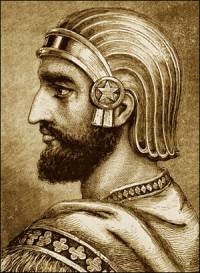Table of Contents
<html>
<a href=“http://lucianofsamosata.info/wiki/doku.php?id=submission_page”><img src=“http://lucianofsamosata.info/images/contact.png” /></a>
</html>
The Downfall of Cyrus
<html><p xmlns:dct=“http://purl.org/dc/terms/”><a rel=“license” href=“http://creativecommons.org/publicdomain/mark/1.0/”><img src=“http://i.creativecommons.org/p/mark/1.0/88x31.png” style=“border-style: none;” alt=“Public Domain Mark” /></a><br />This work (by <a href=“https://lucianofsamosata.info/wiki” rel=“dct:creator”>https://lucianofsamosata.info/wiki</a>), identified by <a href=“http://meninpublishing.org” rel=“dct:publisher”><span property=“dct:title”>Frank Redmond</span></a>, is free of known copyright restrictions.</p></html>
Authored by Frank Redmond, 2005
The downfall of Cyrus and the reasons for his fall are simple. Herodotus in section 1.204 simply states that three things caused the fall of Cyrus: his overarching ambition, his belief in his own invincibility, and his supposed “superhuman origin”. Without a doubt, in Herodotus' mind, these three things were the main ingredients of Cyrus' downfall. But what is the common thread? All three of these contentions reek of hubris, a condition which proves again and again in Greek myth, legend, and history to lead to ruin. Take Croesus for instance. His self-centered conviction that he will destroy Cyrus' empire and not his own demonstrates how blinding hubris can be. Nothing is impossible or out-of-reach for a person infected with hubris simply because they know no boundaries and fail to recognize that they are prone to failure like everyone else. Cyrus is infected with this very sickness of hubris. Cyrus' hopes to crush the Massagetae and displace their queen ultimately fail because Cyrus, riding high on his own ego and selfishness, cannot accept that the Massagetae has no interest in submitting to him and are just as formitable as the Persians. This angers Cyrus to no-end. He cannot accept that there is a potential rival to his power so he childishly resorts to brute force instead of using strategy or cunning to accomplish his ends, which are to embarass the Massagetae's queen and destroy her empire. But in an act of charity, the Massagetae give Cyrus a chance to rethink his decision, wisely proclaiming, “I advise you to abandon your enterprise, for you cannot know if in the end it will do you any good. Rule your own people, and try to bear the sight of me ruling mine” and the Massagetae know as well as we do that Cyrus will ignore this wisdom, for “of course you [Cyrus] will refuse my advice, as the last thing you live for […] is peace”. I think these words were never actually spoken but they are completely made up by Herodotus himself. Herodotus wanted to tell us exactly what he thought of Cyrus' disagreeable hubris and wanted to offer us - the reader - with practical advice on how to avoid the fate of Cyrus. At any rate, Cyrus goes to war with the Massagetae, never realizing the mistake which he has made. At first he is successful by following the instructions of Croesus in that he destroys a third of the Massagetae's army by using a clever strategy, but eventually Cyrus' hubris catches up to him and he lusts for more and more. A third is afterall not a whole. In another editorial stint, Herodotus says this about Cyrus' mindset, “Glutton as you are for blood, you have no cause to be proud of this day's work, which has no smack of soldierly courage”. But once again, and this is to be expected by now, Cyrus ignores these warnings which are clear as day and proceeds full of gluttony and lust. And so, Cyrus engaged in yet another battle and lost his life stupidly at the hands of the Massagetae.
To end, Herodotus cleverly intersperses between the facts of Cyrus' downfall various tidbits of advice and ethical recommendations. Why does he do this? I believe that Herodotus had a concrete idea on what the ultimate purpose of history is. To him, history is to be investigated not only so things might not be forgotten, but also so we can have concrete ethical examples. With history, we can see with a degree of objectivity what valor is, what happiness is, what success is, what evil is, what good is, what hubris is. Paradigms which stand the test of time.
